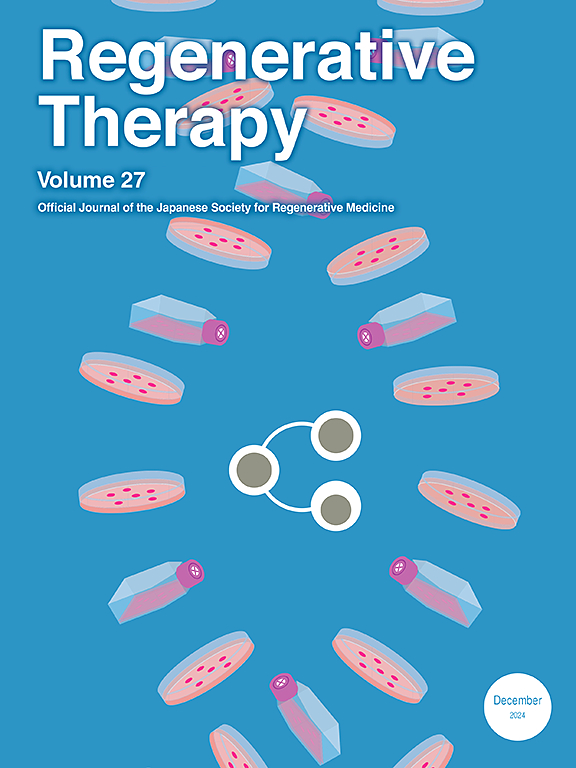Comparative analysis of the use of autologous exosomes and platelet-derived growth factors in women with premature ovarian insufficiency and infertility: A prospective, randomized, observational, analytical study
IF 3.5
3区 环境科学与生态学
Q3 CELL & TISSUE ENGINEERING
引用次数: 0
Abstract
Stromal fibrosis and ovarian aging depend not only on the age of the patients but also on environmental factors, lifestyle and physiological events such as ovulation itself, which leaves repeated scarring in the ovarian stroma, limiting normal tissue vascularization and the provision of biological signals necessary to maintain folliculogenesis and hormone synthesis. In a fibrosed ovarian stroma, there is a decrease in hyaluronic acid concentrations, loss of synthesis and migration proteins, a decrease in microRNAs, in addition to enzymatic alterations that affect mitochondrial kinases, increasing oxygen free radicals, which accelerate cell death.
Objectives
This study seeks to analyze the effectiveness of autologous exosomes in reversing aging and bioregenerating the ovary of patients with ovarian failure and infertility by improving interstitial fibrosis and providing the necessary elements to activate neofolliculogenesis.
Methodology
Prospective, randomized, comparative study in 30 women between 38 and 46 years old, with diminished ovarian reserve and who rejected the egg donation procedure. Three study groups composed of 10 patients each: the first with autologous exosomes, the second with PRP and the third with saline solution.
Results
After completing the study, it was found that women in the Autologous Exosome group showed better ovarian reserve parameters such as FSH, LH, Estradiol, Anti-Müllerian Hormone and antral follicle count, edema of more oocytes collected in Metaphase II, higher fertilization rate, frozen embryos and positive pregnancies.
Conclusion
Ovarian Biostimulation with Autologous Exosomes could be considered a safe and promising therapy to improve markers of low ovarian reserve.
Trial registration
Clinical Trials.gov. Registration Number: NCT06773572. URL: Study Details | Use of Autologous Exosomes vs Platelet Growth Factors to Regenerate the Ovary in Women With Infertility (Exosomas2024-1) | ClinicalTrials.gov.
自体外泌体和血小板源性生长因子在卵巢功能不全和不孕症妇女中的应用比较分析:一项前瞻性、随机、观察性分析研究
间质纤维化和卵巢老化不仅取决于患者的年龄,还与环境因素、生活方式和生理事件(如排卵本身)有关,这些因素会在卵巢间质中留下反复的疤痕,限制正常组织的血管化和维持卵泡发生和激素合成所需的生物信号的提供。在纤维化的卵巢间质中,透明质酸浓度降低,合成和迁移蛋白减少,microrna减少,此外影响线粒体激酶的酶改变,氧自由基增加,加速细胞死亡。目的本研究旨在分析自体外泌体通过改善卵巢间质纤维化和提供激活新卵泡生成的必要元素,在卵巢功能衰竭和不孕症患者中逆转卵巢衰老和生物再生的有效性。方法:前瞻性、随机、比较研究,研究对象为30名年龄在38 - 46岁之间、卵巢储备功能减退且拒绝卵子捐赠的女性。三个研究组每组10例患者:第一组使用自体外泌体,第二组使用PRP,第三组使用生理盐水溶液。结果研究完成后发现,自体外泌体组女性FSH、LH、Estradiol、anti - llerian Hormone、窦卵泡计数等卵巢储备参数较好,中期收集的卵母细胞水肿较多,受精率较高,胚胎冷冻,妊娠阳性。结论自体外泌体刺激卵巢是一种安全、有前景的改善卵巢低储备指标的治疗方法。试验注册:临床试验网站。注册号:NCT06773572。使用自体外泌体和血小板生长因子在不孕妇女中再生卵巢(Exosomas2024-1) | ClinicalTrials.gov。
本文章由计算机程序翻译,如有差异,请以英文原文为准。
求助全文
约1分钟内获得全文
求助全文
来源期刊

Regenerative Therapy
Engineering-Biomedical Engineering
CiteScore
6.00
自引率
2.30%
发文量
106
审稿时长
49 days
期刊介绍:
Regenerative Therapy is the official peer-reviewed online journal of the Japanese Society for Regenerative Medicine.
Regenerative Therapy is a multidisciplinary journal that publishes original articles and reviews of basic research, clinical translation, industrial development, and regulatory issues focusing on stem cell biology, tissue engineering, and regenerative medicine.
 求助内容:
求助内容: 应助结果提醒方式:
应助结果提醒方式:


